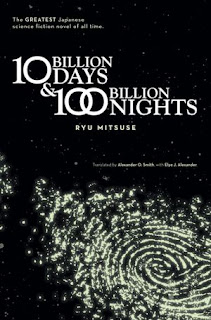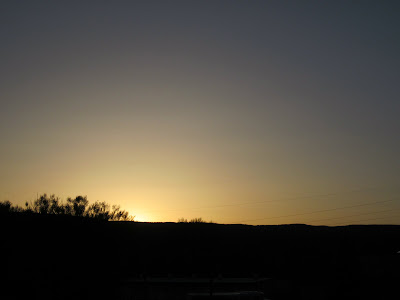10 Billion Days and 100 Billion Nights
Around Christmas, Spousal Unit tried to get me a book. I knew nothing about it, other than it was brand new and somehow, he'd heard of it and thought of me.
I usually stay pretty aware of the awesome new books out in the world, and somehow, I had no idea what this one could be. I was especially confused when Spousal Unit said the bookstore couldn't get it - the distributors were all out of stock. What could be so unexpectedly terrific that everyone wanted it for Christmas?
Finally, the book came in last week. It turned out to be what's regarded as the best Japanese science fiction novel ever written: 10 Thousand Days and 100 Billion Nights by Ryu Mitsuse. Spousal Unit heard about it on NPR.
Intriguing from the start, especially because that swirl on the cover is both a galaxy and a fingerprint. (It gets better: the cover glows in the dark. Insert squeal of delight.)
The first couple of chapters are kind of slow-going. The book starts at the beginning of time, following the formation of stars and planets, the first puddle of water on Earth, the conditions for life to exist, the first fish, and the first thing to climb out of the ocean. It's interesting stuff - it's just a nonfiction for the first couple of chapters. And it's worth it to read on.
Cue Plato. What could a scifi spanning millennia possibly have to do with Plato, you ask? The answer is Atlantis. Soon the great philosopher is having visions, freaking out over panes of glass, and meeting gods. A pretty drastic shift from all that primordial soup of the first chapters.
That's all the further I've read, but I'm excited for more. The book's very brief summary mentions Plato, Buddha, Jesus, and Asura all meeting up at the end of time. (Not entirely sure who or what Asura is, other than a Hindi god - or several gods - who may or may not be evil. And something about power.)
The book was originally written in 1967, and was published in English last year for the first time. I'm not sure why - I'm only on page 79 and it's already worth it. Imagine how someone like Plato might react to a lightbulb, with no introduction whatsoever. That, by itself, is a delightful scene. I still haven't a clue where this book is taking me, but I'm so there.
I just hope the final stop isn't too close to the end of time.
I usually stay pretty aware of the awesome new books out in the world, and somehow, I had no idea what this one could be. I was especially confused when Spousal Unit said the bookstore couldn't get it - the distributors were all out of stock. What could be so unexpectedly terrific that everyone wanted it for Christmas?
Finally, the book came in last week. It turned out to be what's regarded as the best Japanese science fiction novel ever written: 10 Thousand Days and 100 Billion Nights by Ryu Mitsuse. Spousal Unit heard about it on NPR.
Intriguing from the start, especially because that swirl on the cover is both a galaxy and a fingerprint. (It gets better: the cover glows in the dark. Insert squeal of delight.)
The first couple of chapters are kind of slow-going. The book starts at the beginning of time, following the formation of stars and planets, the first puddle of water on Earth, the conditions for life to exist, the first fish, and the first thing to climb out of the ocean. It's interesting stuff - it's just a nonfiction for the first couple of chapters. And it's worth it to read on.
Cue Plato. What could a scifi spanning millennia possibly have to do with Plato, you ask? The answer is Atlantis. Soon the great philosopher is having visions, freaking out over panes of glass, and meeting gods. A pretty drastic shift from all that primordial soup of the first chapters.
That's all the further I've read, but I'm excited for more. The book's very brief summary mentions Plato, Buddha, Jesus, and Asura all meeting up at the end of time. (Not entirely sure who or what Asura is, other than a Hindi god - or several gods - who may or may not be evil. And something about power.)
The book was originally written in 1967, and was published in English last year for the first time. I'm not sure why - I'm only on page 79 and it's already worth it. Imagine how someone like Plato might react to a lightbulb, with no introduction whatsoever. That, by itself, is a delightful scene. I still haven't a clue where this book is taking me, but I'm so there.
I just hope the final stop isn't too close to the end of time.




Comments
Post a Comment